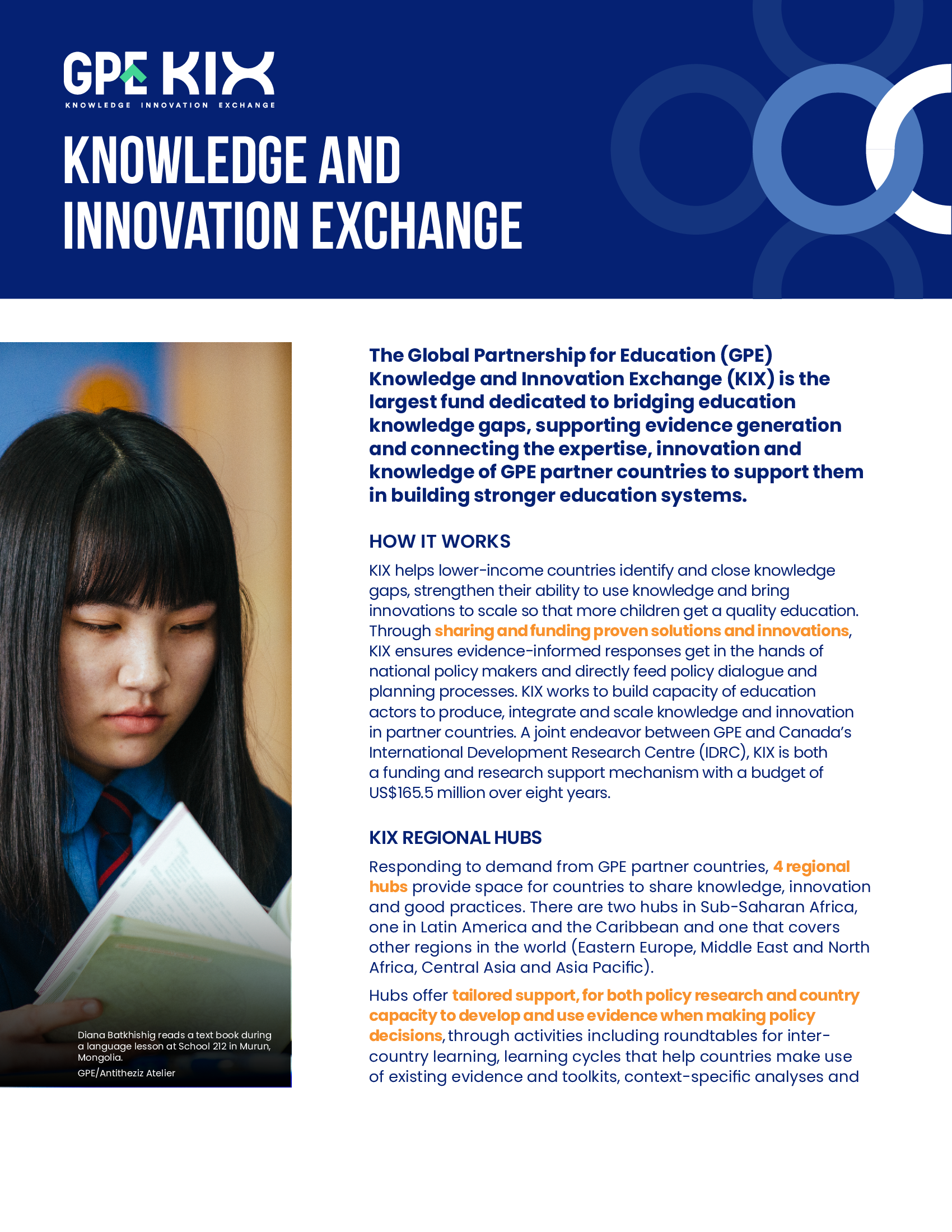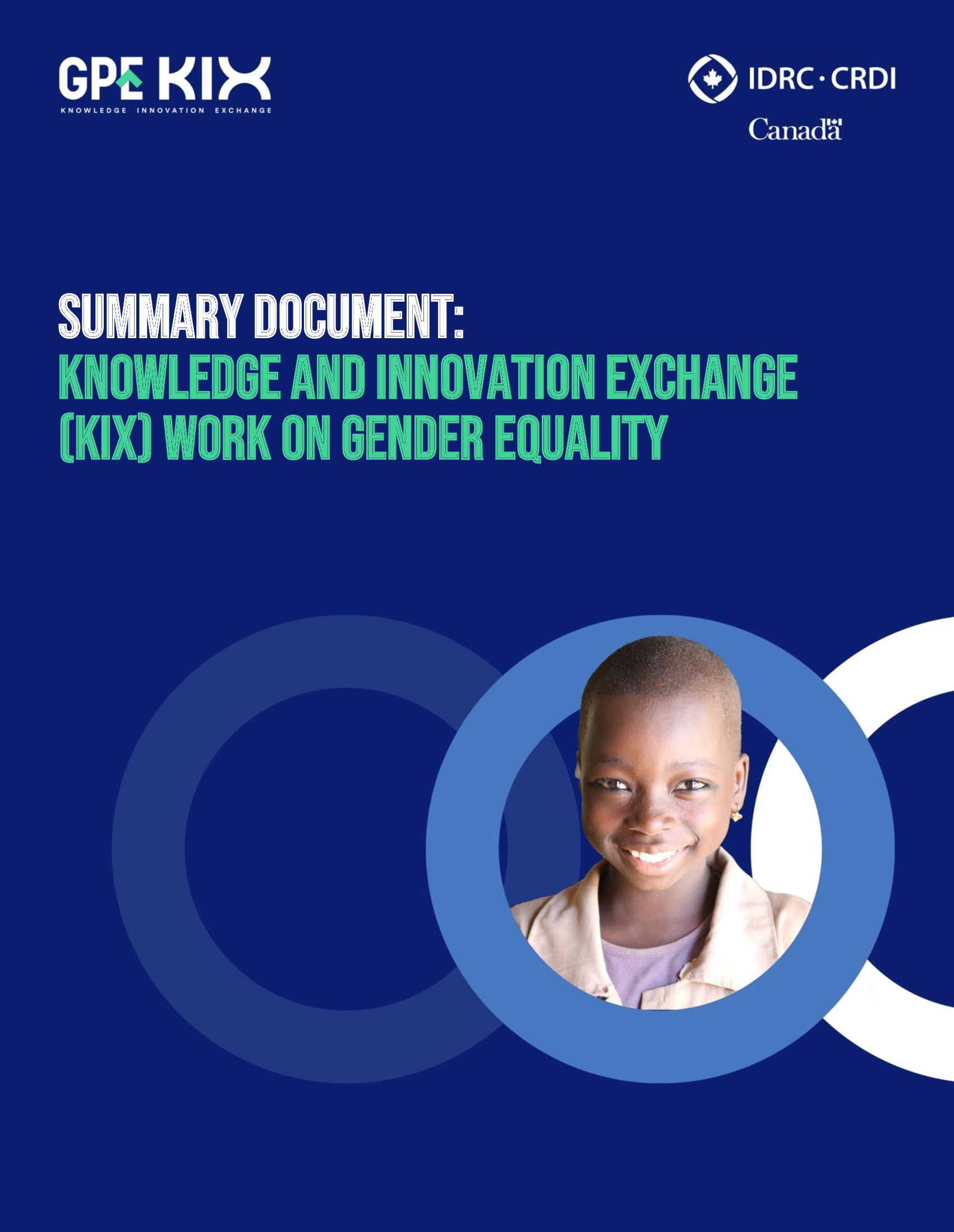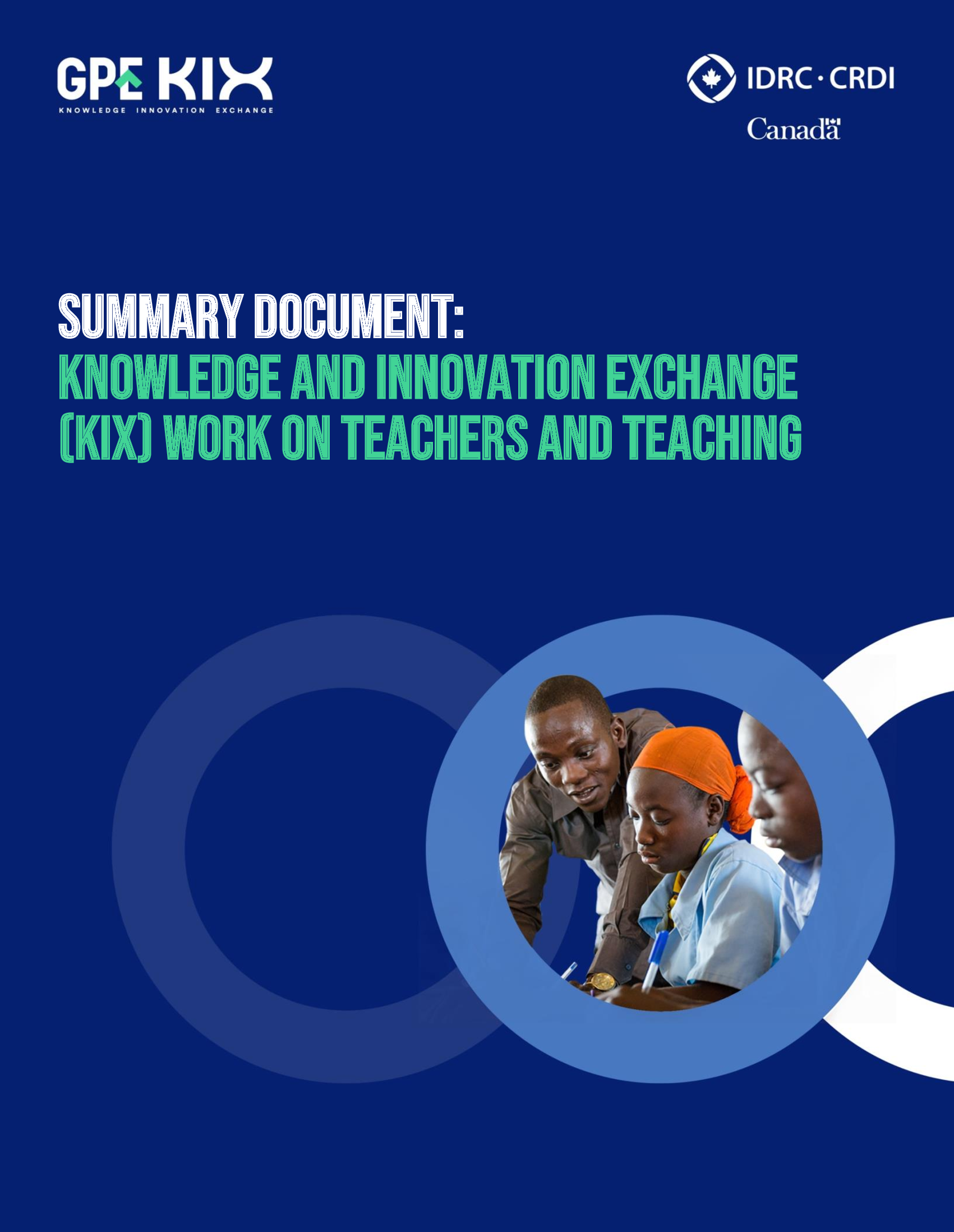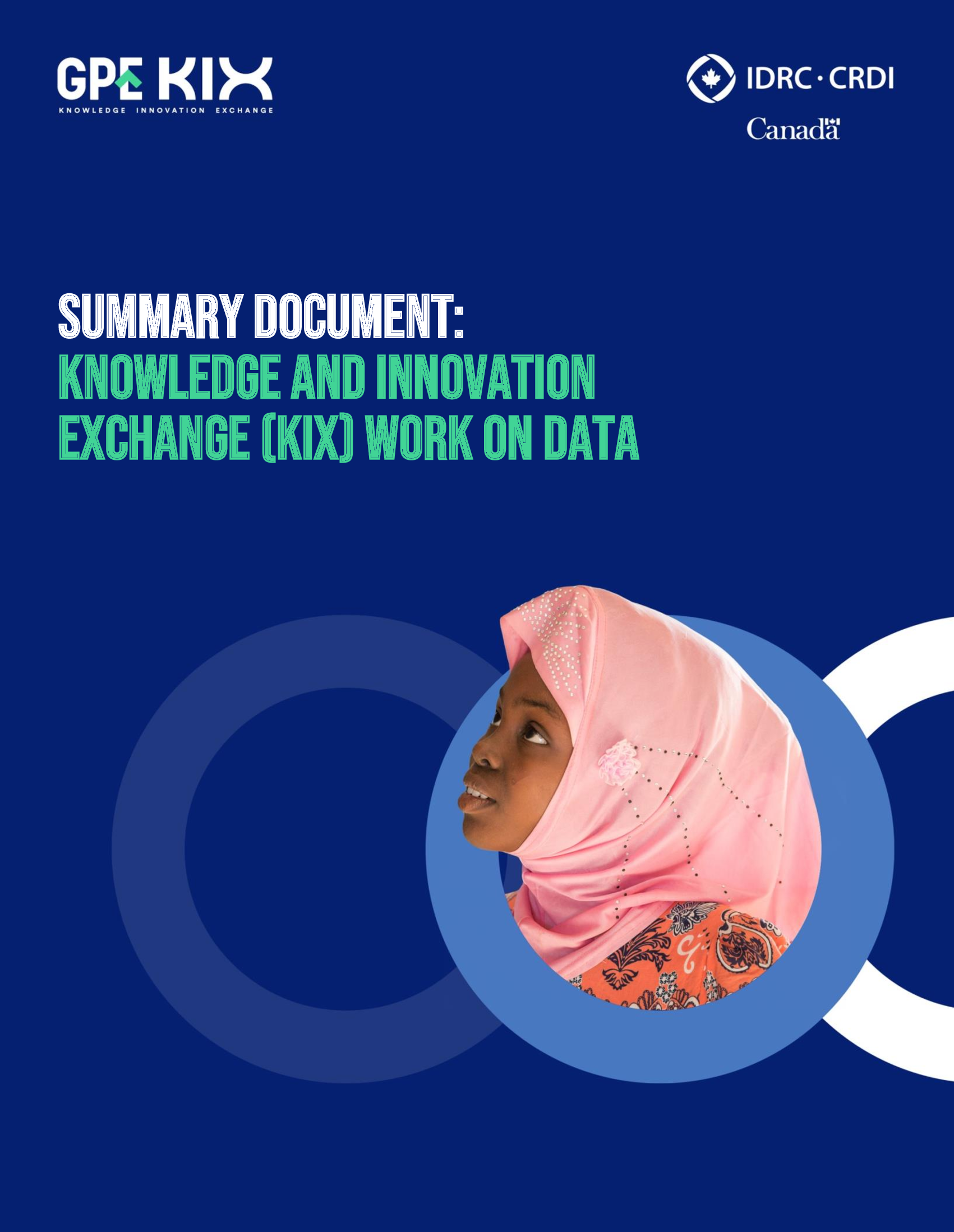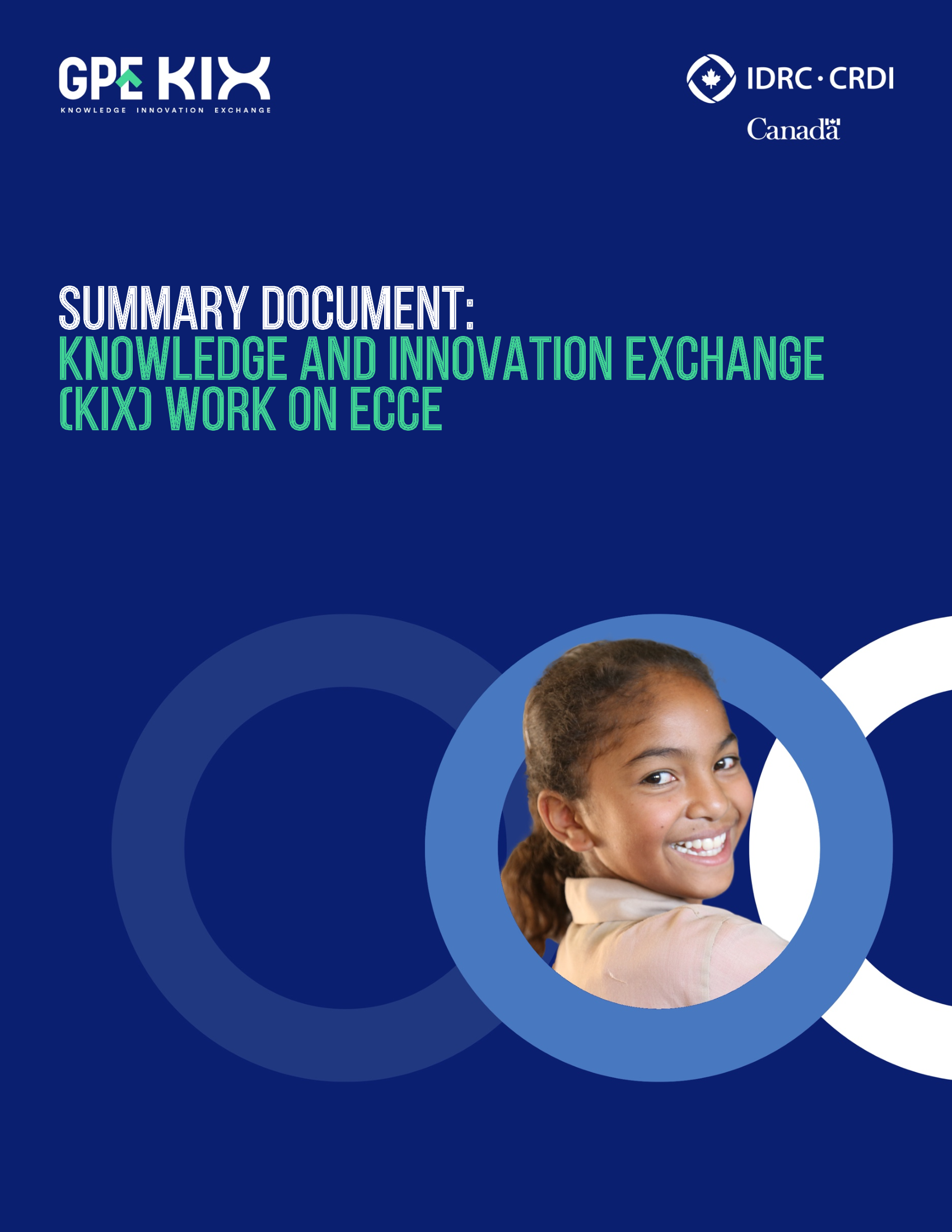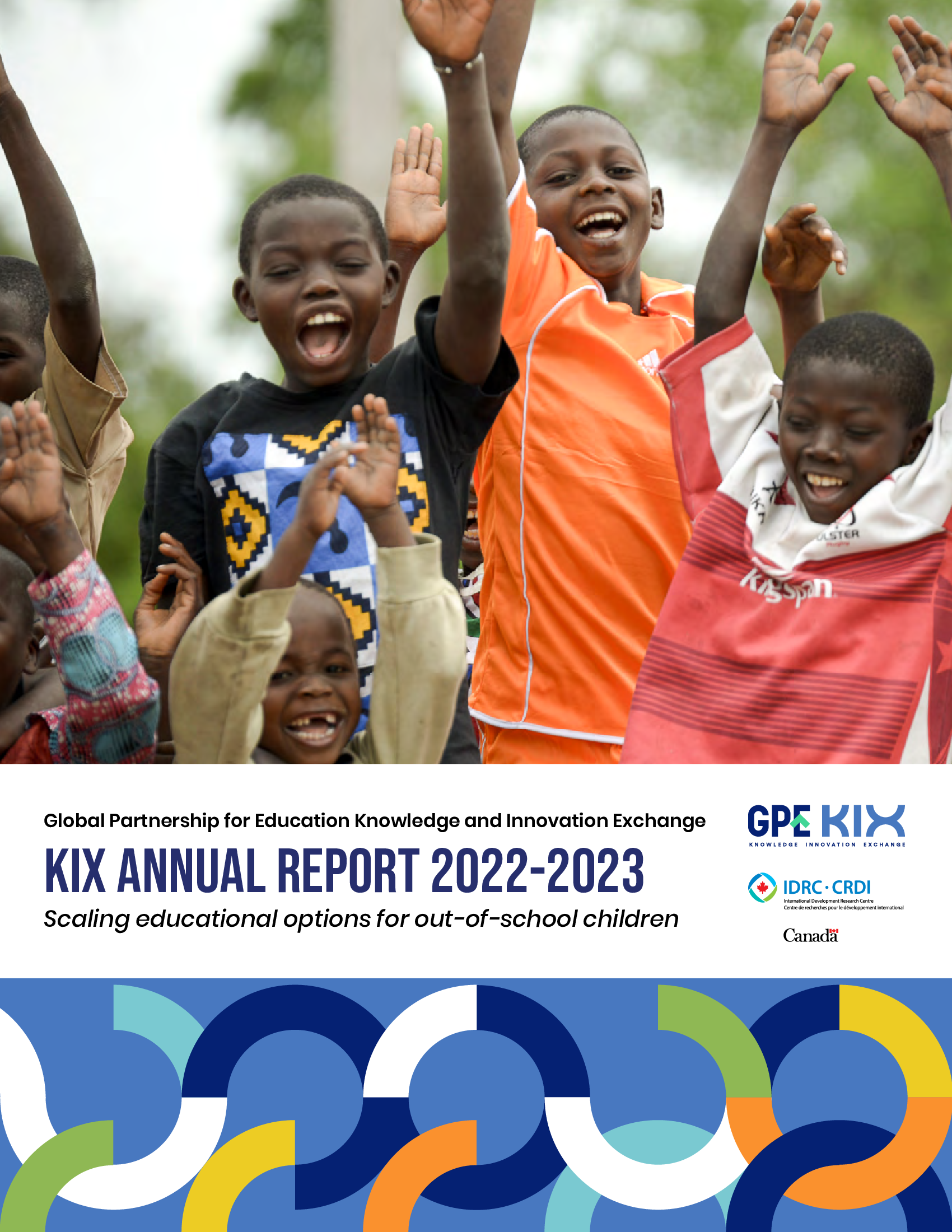How does KIX work?
KIX helps more than 70 GPE partner countries adapt, test and scale proven approaches in key themes through 4 regional hubs and 41 applied research projects.
- KIX brings partners together in 4 regional hubs to share information, innovation and best practices.
- KIX is a funding mechanism that provides grants in 53 countries to generate knowledge and innovation, and to scale proven approaches.
- KIX is a country support mechanism through which hubs offer tailored support for customized research and knowledge for policy moments, as well as strengthening countries’ capacities to generate and use evidence.
KIX focus areas:
- Find, fund and scale proven solutions to address the key educational challenges identified by partner countries, support systems transformation and ensure these solutions feed into their education sector policy and planning processes.
- Fund new research to fill knowledge gaps and generate innovative responses to issues identified by partner countries.
- Deepen our understanding of successfully scaling innovations such as products, processes, strategies or approaches to make education systems more effective.
- Expand the learning ecosystem by developing the capacity of organizations in lower-income countries to learn, innovate, build and use evidence.
- Strengthen governments’ capacity to innovate and generate and use evidence and data.
- Drive alignment and relevance of education knowledge and innovation funding between international actors.
Regional hubs
The 4 KIX regional hubs surface policy challenges and responses, and support knowledge mobilization and exchange. The hubs lead regular consultation and validation processes with partner countries to identify policy priorities in their regions.
Over 60 countries and 250 individuals represent their countries through ‘national KIX delegations’ comprised of government and other local education group members, including development partners and civil society organizations. Each hub convenes national delegations of the countries they support.
- A consortium comprised of the United Nations Educational, Scientific and Cultural Organization (UNESCO), The United Nations Children's Fund (UNICEF) and the African Union manages the hub that oversees activities for 19 GPE partner countries, primarily Anglophone.
- A consortium comprised of the Institut de la Francophonie pour l'éducation et la formation (IFEF), Conférence des Ministres de l'éducation des États et gouvernements de la Francophonie (Confemen) and the Agence Universitaire de la Francophonie (AUF) manages the hub that oversees activities for 21 GPE partner countries, primarily Francophone.
Asia-Pacific, Middle East and North Africa, Eastern Europe and Central Asia:
- The Network for international policies and cooperation in education and training (NORRAG) manages the hub that oversees activities in 21 GPE partner countries.
Latin America and the Caribbean:
- A consortium comprised of SUMMA and the Organization of Eastern Caribbean States (OECS) manages the hub that oversees activities in 8 GPE partner countries.
Research grants
KIX funds 41 applied research grants implemented in 53 countries, most of which are based in lower-income countries. This research builds evidence, mobilizes knowledge and strengthens capacity to adapt and scale innovative approaches for education priorities of partner countries.
KIX grants reinforce and enhance the effectiveness of GPE grants that support system transformation and policy dialogue.
New calls for proposals for research grants will be issued between May 2023 and March 2024.
- Single country grants range from US$300,000- US$ 500,00 for up to 1.5 years.
- Multi-country grants range from US$800,000 to US$1.5 million for up to three years and US$2.5 million for 3 to 5 years.
Research themes are guided by hub consultation and validation processes, and a scoping study of partner countries.
Grants under the following themes are funded until 2027:
- Data systems
- Gender, equity and inclusion
- Teacher professional development
- Early childhood education
Gender, equity and inclusion considerations are key priorities across the calls. New projects funded will be either led or implemented by organizations in lower-income countries.
IDRC issues calls for proposals, manages the independent assessment panels and contracts successful grantees. IDRC also oversees and supports KIX grantees.
Country support mechanism
The country support mechanism provides tailored support, including customized research and knowledge mobilization for specific policy processes and to strengthen countries’ capacities to produce and use evidence.
Coordinated by the regional hubs and operational from July 2023, it will finance targeted evidence synthesis to inform policy needs, including those linked with GPE grant processes, and support implementation research to accompany national education reform agendas.
It will also help research organizations in lower-income countries engage more effectively in policy research and evidence synthesis.
Results
KIX has recorded 116 instances of research uptake through which evidence and knowledge mobilization contributed to improvements.
KIX-supported research and learning helped shape decisions on funding for accelerated education programming in Sierra Leone, teacher training in Uzbekistan, and the integration of 21st-century skills in Vietnam and the Maldives.
In Sierra Leone, where the issue of out-of-school children is pressing, results from a comparative study of accelerated education programs and girls’ education models in Ghana, Nigeria, and Sierra Leone informed the government’s decision to allocate over US$22 million from the Qatar Foundation to accelerated education programs. This project shared its research findings with the Ministry of Education including through policy briefs and events. Its influence on the government’s decision will support scaling, giving more children the opportunity to return or gain access to school.
In Uzbekistan, the Presidential Educational Institutions of the Republic (PIIMA) adopted the TPD@Scale model, to provide teacher training to improve instructional quality and learning. The Ministry of Education has tasked the recently established Center for Pedagogical Excellence with overseeing the adoption and expansion of TPD@Scale. PIIMA views the hybrid online and in-person TPD@Scale model as offering a cost-effective way to provide ongoing professional skills development. The hybrid model also enables rural teachers without Internet access to complete courses offline.
In 2022, Vietnam’s Ministry of Education and Training reviewed how skills integration is being implemented under its 2018 General Education Curriculum. Based on this review, the Department of Secondary Education has engaged technical support to develop a set of teaching guidelines and will conduct training for secondary school teachers to ensure they are covering relevant 21st-century skills.
In 2023, the Maldives Ministry of Education decided to act on a strategic plan produced by a team of five national experts who participated in the same KIX EAP Learning Cycle. The ministry has called for a comprehensive curricula review aimed at integrating these skills at all levels.








